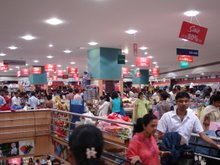Subhiksha faces shortfall as expansion leads to stockout
AGGRESSIVE expansion in Mumbai has put discount retailer Subhiksha in a spot. After setting up close to 80 stores in the city and its outskirts in less than three months, the retailer is facing scalability issues in terms of severe stockouts, or nonavailability of products, in a lot of key FMCG categories like soaps, detergents and foods. Speaking to ET, Subhiksha Trading Services MD R Subramaniam confirmed, “We have been short by 20-25% of some categories in our stories in Mumbai.” Mr. Subramaniam says that this is directly attributable to Subhiksha’s growth in Mumbai. He adds, “We had underestimated the demand in Mumbai, and the products have shown they are selling faster.”
But industry sources say that Subhiksha has no more than 750-800 stock keeping units (SKUs) per store, when it should hold at least 1,500 SKUs. Scores of customers have found that products haven’t been available in key stores. In their
Industry experts say that Subhiksha wouldn’t have encountered these stockouts if they had a different distribution system. Currently, they supply their stores in Mumbai from their distribution hub at Bhiwandi, a satellite town in Thane. Their consolidated buying process directly from manufacturers ensures that they get distributor margins of up to 5% from companies in addition to retailer margins. But this is hardly a huge cost-saver since Mumbai attracts an Octroi duty of 4% for all goods entering the city. Their aggressive pricing, on average 8-10% lower than the MRP, in addition to nearly 16-17% of overheads and operating costs, means that they’re perhaps making no more 1-2% margins on most goods.
Most other organised chains in Mumbai like DMart and Food Bazaar have opted not to go in for a centralised distribution system because of Mumbai’s linear geography — they would rather use the distribution backbone of the consumer goods companies. Explains a retailer, “In Mumbai, Subhiksha will have to start from the North and go further South to feed their stores. This will add to their costs since there’s no shorter way to do it. They also can’t do this thrice a week like the leading FMCG companies do.”
However, Mr. Subramaniam says that the distribution hub has been planned so that they can service their stores outside Mumbai as well. He says, “I have to service stores in Thane and Kalyan which are outside the Greater Mumbai area. A distribution hub within Mumbai means that we are subject to multiple octroi if we are supplying outside Mumbai city.” Also, with sales data available for two full months, Subhiksha’s executives are in a better position to predict consumer demand for March. Mr. Subramaniam says that Mumbai would be a great success. He says, “Normally we have a benchmark of annual sales of Rs 20,000 per sq ft, but I expect Mumbai to garner in Rs. 30,000 per sq ft for this year.” But perhaps the product mix, currently more in favour of FMCG products, might have to be tweaked slightly. Says Bhushan Lawande, corporate trainer and retail consultant, “The universally sold SKUs like soaps and detergents bleed a lot if you’re discounting them by 8-10%. Groceries and vegetables have to contribute substantially to the revenues for Subhiksha.” High growth in organised retail is good news for the retail industry but it is now time to get ready for the challenges.
store, “Customers come to my store saying that Subhiksha doesn’t have household essentials by the end of the month.”courtesy:economictimes
For more on Retail India visit www.retailindia.tv


No comments:
Post a Comment